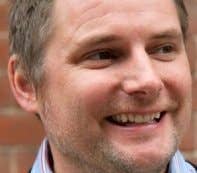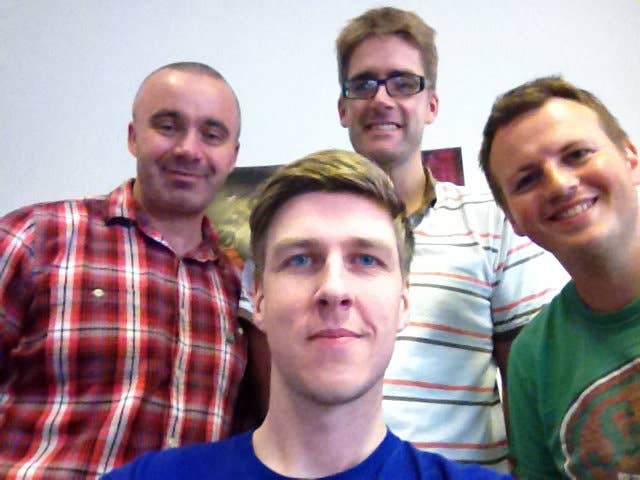Going Coastal
Ahead of the Develop Conference, Dan Pearson takes a look at what makes Brighton a games industry hub
Relentless
Within 5 years, the audience for mass-market games will have grown from an estimated 50 million to over 500 million people. In another 5 years time that audience will have grown to over 2 billion people. As platforms such as iOS, Facebook and connected TVs make gaming accessible to everyone, Relentless' recipe of simple, familiar games that are instantly understandable and playable by everyone will come into its own. By 2020, the hardcore console will no longer be a barrier to entry and games will be available to and played by everybody.

The studio has bulldozed the "barriers to entry" by working on early camera sensing games, introducing a simplified Buzzer controller, using TV show metaphors and never requiring previous games experience. Since 2003, it's made living room games social and inclusive. As the necessity of owning a console to play a Relentless game dissipates, a non-gamer audience will be able to enjoy the company's games for the first time on a device they own already.
How can the UK best apply its pool of talent to a successful games industry?
Andrew Eades: The UK is a creative country. With the rise of new digital distribution platforms, we should take advantage to not only continue creating amazing games but also retaining ownership of them. We're staring a new golden age of games so let's keep some of it in the UK.
What's currently the biggest barrier/threat to that success?
Our biggest barrier is finance. We need to build up a UK investment community that is enabled and prepared to invest in the future of our industry.
Roundcube Entertainment
Roundcube Entertainment is a new studio in Brighton focussing on bringing AAA console quality and production values to XBLA, PSN and emerging platforms. With a team that's used to providing thrills on an epic level, with titles like Split/Second in their back catalogue, Roundcube hopes to deliver memorable, connected experiences onto both console and beyond.
The goal for Roundcube is to establish themselves as a developer that always guarantees a certain level of quality, to be innovative and passionate about everything it does, and to be recognised as a name that means an experience that will stay with you long after you've put the joypad or tablet down...

Nick Baynes: Brighton's an amazing place to develop games, and as more and more studios set up here it makes it more attractive for team members to come down and join the fun, while making the whole business more sustainable for all the companies here due to a larger - and therefore more scalable, and flexible - resident workforce. From a creative point of view, there aren't many better places in the UK to craft your trade, as the diversity and vibrancy of the city has a real creative buzz about it, from the boutique shops in the Lanes, the clubs and bars, to the quite often oddball architecture and surrounding countryside.
How can the UK best apply its pool of talent to a successful games industry?
"Trying to create local networks of studios that can share talent is one way of helping studios survive and manage their headcount - which is something seemingly happening in Brighton right now - and that's going to massively help job security. Studios in physical isolation find it much harder to attract top talent, so consciously trying to create a series of regional "Videogame Valleys" will help where possible.
"Being realistic but not pessimistic in our aims is important too. There's a danger that so many of us having been burnt by $30 million development all jump to two or three man iOS teams, and miss the healthy and creatively exciting middle ground. Making sure that as UK studios enough of us still aim at larger targets is essential to make sure the draining of big project talent doesn't become a self fulfilling prophecy."
Trying to create local networks of studios that can share talent is one way of helping studios survive and manage their headcount.
Nick Baynes, RoundCube Entertainment
What's currently the biggest barrier/threat to that success?
"Honestly, I think that we need to start bigging ourselves up more. When Black Rock went down for example, most people assumed they'd have to move abroad as by reading the press it seemed there'd be no jobs in the UK. The eight or nine studios that came down in that following week, and continue to offer jobs to ex-Black Rockers, shows that the picture isn't as dark as it seems.
"In this country we seem to like talking ourselves down and it's surprising how much that becomes embedded in your head as fact when really it's not. Of course there are a lot of fantastic jobs abroad, and the ongoing tax break issues don't help, but despite the recent studio closures the British industry is in a much healthier state than the way it's reported would lead you to believe. I think the sooner we shake that false belief off the more people will choose to stay and make a success of things here rather than running to Canada and elsewhere under the assumption it's the only safe option.
ShortRound Games
ShortRound Games was formed in June this year after seizing the opportunity to go it alone in the first round of layoffs from Disney's Black Rock Studio. The company is made up by four industry veterans with over 40 years collective experience in making high quality games, with credits on multiple AAA racing and action titles, including director and lead positions on Burnout, Army of Two and Split/Second.
The four friends and colleagues; Andy, Kim, Steve and Stuart, started ShortRound to fulfil what they originally came into the industry for; make games they want to play in the way they want to make them. The company's aim is to produce high quality products, whilst ensuring they absolutely fit the platform they sit on.
The past few months have been absolutely fascinating. We have gone from being small cogs in a very large machine, to starting our own company and taking control of our own direction.
Stuart Pharoah, ShortRound Games
ShortRound has already developed a couple of their concepts into demos, and are currently taking one of these through to a full game which will be announced very soon.
Stuart Pharoah: "The past few months have been absolutely fascinating. We have gone from being small cogs in a very large machine, to starting our own company and taking control of our own direction. It has also been amazing to see how fast we can develop a concept when it's our own ideas motivating us. In just over four weeks we have worked up an idea, pitched it and had it signed - something that has taken us all by surprise."
How can the UK best apply its pool of talent to a successful games industry?
"The industry in this country has of late shown that large expensive studios producing risky unproven AAA products is very hard to sustain. When team sizes are brought right back down to manageable levels, they can operate in far more efficient and creative ways. Cutting the red tape and reducing the chain of command, stops ideas from being watered down, and leads to nimble and adaptable teams that can capitalise on their creativity."
What's currently the biggest barrier/threat to that success?

"We are sadly in a spiral at the moment in this country. With their tax breaks and incentives, countries such as Canada have over the past 7-8 years been attracting a lot of our best talent. They have done this by offering big projects and big rewards, and as a result it has proven hard for UK teams to fill some key roles.
"This in turn has lead to a decline in the number of big titles being developed here, which has forced more people abroad... and so on. Until development costs in this country are more competitive, we will struggle to attract the big projects and big talent."
